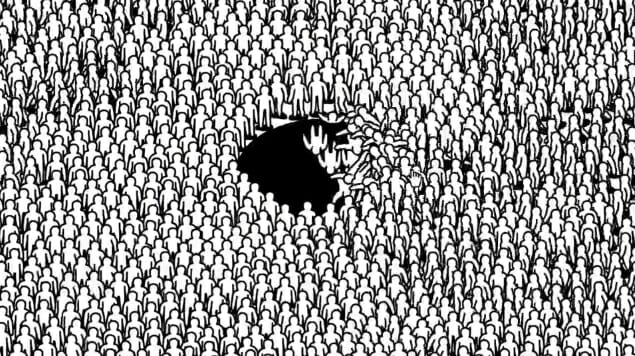
In a way, Kids follows that old, annoying question parents ask their young, impressionable, teenage children: If your friends jumped off a cliff, would you do it? But instead of a cliff, it’s a large black hole, and instead of leading to someone’s death, it leads back to the black hole. Kids moves beyond that yes or no question, and pivots to a discussion on group dynamics, and what happens when someone follows a crowd, or decides to go their own path.
Kids is an interactive animation by Michael Frei and Mario von Rickenbach. Made by the same people who created Plug & Play, Kids follows a similar, simple design. This time the animation follows a large group of people as they move this way and that. You can lead a person to follow the group or move against them, yet no matter where each person goes, the crowd always leads back to the giant black pit, waiting for you to push them all in.
While the game is black and white, its meaning is not. The game’s message is open-ended, and entirely up to the player’s interpretation. I find something joyous about Kids, about how one kid will say to go this way, while another says that way, and how quickly the first kid will change their mind and agree to go that way. When I played, I tried to be as rambunctious as I could. I tried to zig while others zagged. I wanted the group to be as discordant as it could be. In some situations, the game allowed for that, but in other scenes, the game would not progress until I put everyone in an orderly file. Eventually, the group ran in the same direction, everyone in their own place, everyone moving together toward the same black hole.
Kids is not only an interactive animation, but also a short film and museum installation. As the film’s synopsis asks, “Where does the individual end and the group begin? What is done by choice, and what under duress?” Kids is interested in watching groups assemble and disassemble. It felt like how rivers naturally flow toward an ocean or sea; water wants to flow with water, much how humans tend to want to socialize, to make friends, to become a group.
Games typically force the player into the leadership role. As the protagonist, the hero, the chosen one, games give the player every ounce of power to lead them towards victory—a world saved from destruction, or a loved one rescued from danger. Kids gives the player power and takes it away. Sometimes you lead the group, and sometimes you are merely a part of its ebb and flow.
Kids is a very brief pause from power fantasies. It’s a look into what happens after you decide to jump off a cliff with others. Whatever its meaning is, it stays buried under the scuttle of people running this way and that way, until everything is sucked into the void.
Shonté Daniels is a poet who occasionally writes about games. Her games writing has appeared in Kill Screen, Motherboard, Waypoint and elsewhere. Her poetry can be seen at Puerto del Sol, Baltimore Review, Phoebe, and others literary journals. Check out Shonte-Daniels.com for a full archive, or follow her for sporadic tweeting.